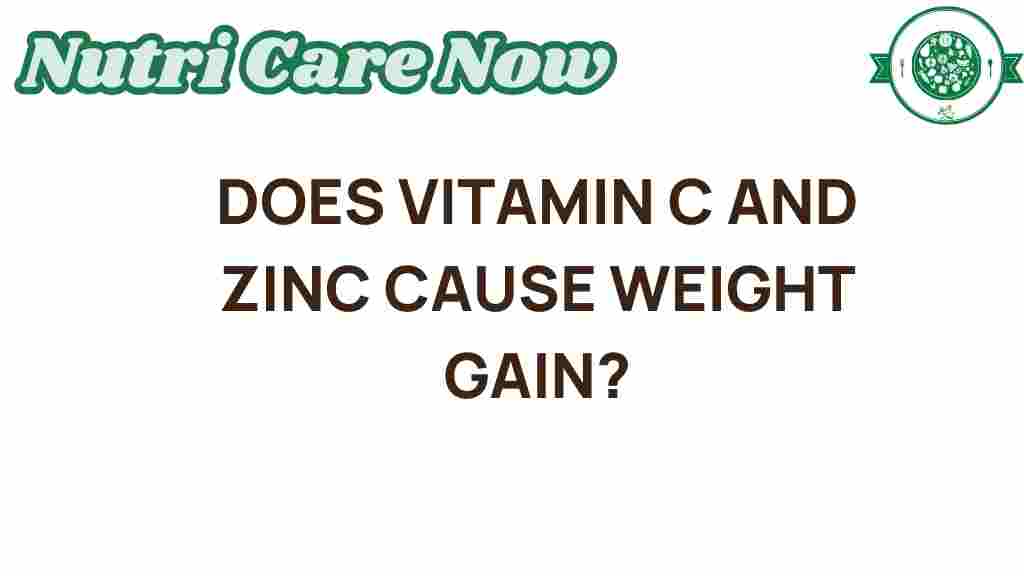The Surprising Truth: Do Vitamin C and Zinc Lead to Weight Gain?
In the realm of nutrition, myths abound, especially when it comes to supplements and their effects on our health. One of the most debated topics is whether essential nutrients like Vitamin C and Zinc contribute to weight gain. With various health claims circulating in social media and wellness blogs, it’s important to delve into the science behind these nutrients and their actual impact on our bodies. This article aims to clarify the relationship between Vitamin C, Zinc, and weight gain while debunking prevalent health myths.
Understanding Vitamin C and Zinc
Before exploring their potential effects on weight gain, let’s first understand what Vitamin C and Zinc are, their roles in our body, and their importance in nutrition.
What is Vitamin C?
Vitamin C, also known as ascorbic acid, is a water-soluble vitamin that plays a crucial role in various bodily functions, including:
- Antioxidant protection
- Collagen synthesis
- Immune support
- Absorption of iron from plant-based foods
What is Zinc?
Zinc is a vital mineral that supports numerous biological functions, such as:
- Immune system function
- Wound healing
- Protein synthesis
- DNA synthesis
The Role of Nutrition in Weight Management
Nutritional health is fundamental for maintaining a healthy weight. The balance of calories consumed versus calories burned determines whether you gain or lose weight. While supplements can play a role in overall nutrition, they are not a substitute for a healthy diet and lifestyle.
Do Vitamin C and Zinc Lead to Weight Gain?
To answer the question of whether Vitamin C and Zinc contribute to weight gain, we must look at the research and evidence available.
The Science Behind Vitamin C
Vitamin C is often touted for its role in boosting the immune system and promoting overall health. However, it is not associated with weight gain. In fact, some studies suggest that Vitamin C can aid in fat metabolism, as individuals with adequate levels of Vitamin C may oxidize fat more efficiently during exercise.
Research indicates that:
- Higher Vitamin C levels are linked to lower body fat.
- Deficiency in Vitamin C may lead to increased fat accumulation.
The Science Behind Zinc
Similarly, Zinc is essential for many metabolic processes but is not directly linked to weight gain. Some studies suggest that Zinc can support weight loss by:
- Regulating appetite
- Improving metabolism
- Supporting muscle growth
It is important to note that excessive Zinc intake can lead to adverse effects, including nausea and disruption of nutrient absorption, which may indirectly influence weight.
Common Health Myths About Vitamin C and Zinc
As we explore the relationship between these nutrients and weight gain, let’s debunk some common health myths:
Myth 1: Vitamin C Causes Weight Gain
Many people believe that taking Vitamin C supplements can lead to weight gain. This myth likely stems from the misconception that any supplement can lead to an increase in body weight. In reality, Vitamin C does not contain calories and therefore cannot cause weight gain.
Myth 2: Zinc Supplements Make You Hungry
Another prevalent myth is that Zinc supplements increase hunger. While Zinc is essential for regulating appetite, it does not inherently cause increased cravings. In fact, a deficiency in Zinc could lead to reduced appetite.
Supplements vs. Dietary Sources
While supplements can help individuals meet their nutritional needs, obtaining Vitamin C and Zinc from natural food sources is often more beneficial. Here are some excellent dietary sources:
Vitamin C Sources
- Citrus fruits (oranges, lemons, grapefruits)
- Bell peppers
- Strawberries
- Broccoli
- Kale
Zinc Sources
- Red meat
- Poultry
- Beans
- Nuts and seeds
- Whole grains
Incorporating these foods into your diet can help maintain adequate levels of Vitamin C and Zinc without the need for supplements.
How to Maintain a Healthy Weight
To effectively manage your weight, focus on the following strategies:
1. Balanced Diet
Ensure your diet includes a balance of:
- Fruits and vegetables
- Whole grains
- Lean proteins
- Healthy fats
2. Regular Exercise
Incorporate both aerobic and strength training exercises into your routine.
3. Stay Hydrated
Drink plenty of water throughout the day to support metabolism and overall health.
4. Monitor Portion Sizes
Be mindful of portion sizes to avoid overeating.
5. Get Enough Sleep
Quality sleep is vital for maintaining a healthy weight and metabolic function.
Troubleshooting Tips for Weight Management
If you find yourself struggling with weight management, consider the following troubleshooting tips:
1. Track Your Food Intake
Use a food diary or app to monitor your daily caloric intake and nutritional balance.
2. Evaluate Your Snack Choices
Choose nutrient-dense snacks over processed options that are high in sugar and unhealthy fats.
3. Manage Stress
Stress can lead to emotional eating. Practice relaxation techniques such as meditation or yoga.
4. Consult a Professional
If you have ongoing concerns about your weight or nutrition, consider consulting a registered dietitian or healthcare provider.
Conclusion
In summary, both Vitamin C and Zinc are essential nutrients that support overall health but do not directly contribute to weight gain. Understanding the facts about these nutrients helps debunk common health myths and encourages a balanced approach to nutrition and weight management.
By focusing on a nutritious diet, regular exercise, and lifestyle changes, you can effectively manage your weight while reaping the benefits of Vitamin C and Zinc. Always remember that supplements should complement a healthy diet, not replace it.
For more information on nutrition and health myths, check out this Healthline article. If you’re looking for personalized advice, consider visiting a healthcare professional.
This article is in the category Supplements and created by NutriCareNow Team
